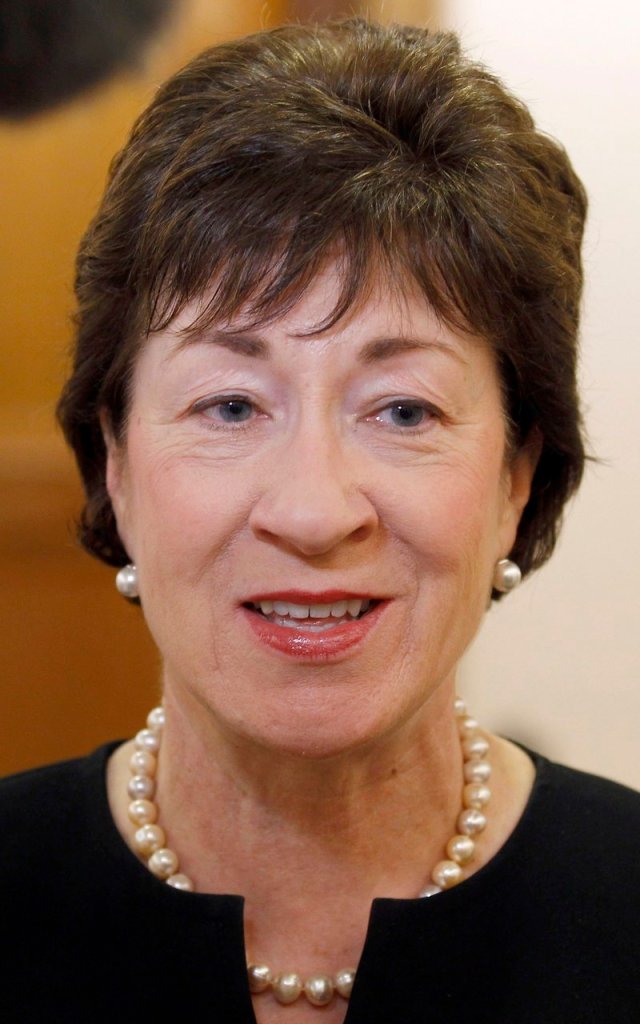WASHINGTON — U.S. Sen. Susan Collins, who is among a dwindling number of centrists in Congress, said Tuesday night that the lack of civility between Republicans and Democrats is a reflection of the wider society.
The Maine Republican spoke at the Washington National Cathedral during a forum examining how to improve cooperation between political rivals, at a time when working with a member of the other party could cost a politician his or her job.
“I cite as evidence the popularity of attack journalism on cable television, the growing incidence of bullying in schools, the use of the Internet to anonymously smear those one does not like, and the audience appeal of television programs in which people are fired or voted off islands,” she said.
Divisive discourse isn’t confined to the nation’s capital. Maine’s Republican gubernatorial candidate, Paul LePage, made national headlines last week after pledging at a public forum that, if elected, he regularly would tell President Obama “to go to hell.”
He later said he regretted his choice of words, but did not apologize.
Maine’s junior senator declined to say whether LePage should apologize.
“I’m not going to comment on his choice of words,” she said before delivering her speech. “He’s already said that he wished he’d used other words. So I think that’s pretty well finished.”
Collins and fellow Maine Sen. Olympia Snowe – another moderate Republican – are swing votes on just about every significant piece of legislation that goes through an increasingly contentious Congress, which for now is controlled by Democrats.
Maine’s senators crossed party lines to help Democrats pass the $787 billion economic stimulus bill, as well as the Wall Street reform bill. However, they voted against Obama’s health care reform legislation, which ultimately passed with no Republican support.
The criticism Collins received from partisans on both sides of the stimulus bill – on the left for demanding less spending and on the right for having worked with Obama and the Democrats – was “extremely personal and painfully nasty,” she said.
Collins put some of the blame on Democrats. In the past two years, she said, Democratic leadership in the Senate has used tactics to prevent Republican amendments on legislation.
“That, in turn, causes Republicans to overuse the filibuster, because our only option is to stop a bill to which we cannot offer amendments,” she said.
It’s also hard to have a strong working relationship with Democrats who campaigned against her. When she took office in 1997, the unwritten rule was that senators never campaigned against colleagues.
So during her 2008 campaign, Collins said, she was “shocked” that two Democratic colleagues came into Maine and “unfairly criticized my work. My willingness to cross the aisle to work on problems had been well established over the past decade.”
“It is difficult to consider someone a colleague and a potential legislative partner who has traveled to one’s home state to criticize one’s work,” she said.
Civility hit a new low during this election cycle, she said, when some senators campaigned against colleagues in their own parties by endorsing primary opponents.
Collins was re-elected easily in 2008. She defeated Tom Allen, taking close to 62 percent of the vote. It was an otherwise bad year for Republicans.
The trend, approaching the midterm election next month, points toward more partisanship – not less.
Conservative activist and tea party choice Christine O’Donnell defeated moderate Rep. Mike Castle in the Republican primary for U.S. Senate in Delaware. Utah Republicans kept U.S. Sen. Robert Bennett off the ballot this year in retaliation for being too moderate. Tea party favorite Sharron Angle is in a close race challenging Senate Majority Leader Harry Reid, a Democrat from Nevada.
Ultimately, voters will decide how they want to be governed, Collins said.
“To keep around those of us who bridge the partisan divide will require the energetic support of opinion leaders like you who say they want a less confrontational, more effective government,” she said.
Partisanship was selected as the topic of this year’s Nancy and Paul Ignatius Program, which tries to identify and find solutions to pressing problems. The prior two annual forums covered American foreign policy.
Headlining the event were David Axelrod, a top adviser to President Obama, and Joshua Bolten, former chief of staff to President George W. Bush. Tuesday night’s program was moderated by CBS News journalist Bob Schieffer.
Axelrod said the partisanship started right away when Obama took office in January 2009. The administration’s first major legislation was the economic stimulus bill.
“It was so clearly a time of national emergency,” Axelrod said. “The president went up to Capitol Hill to talk to Republican members of the House, about the recovery, to make the case. On his way up there they released a letter saying that they were voting unanimously against it.”
Axelrod made a point Tuesday night of thanking Collins, “who had the courage to stand with us on the recovery act,” he said. “I’m not sure I’m helping her political career by saying that. She deserves enormous credit. She was willing to set aside partisanship and stand with us.”
Send questions/comments to the editors.



Success. Please wait for the page to reload. If the page does not reload within 5 seconds, please refresh the page.
Enter your email and password to access comments.
Hi, to comment on stories you must . This profile is in addition to your subscription and website login.
Already have a commenting profile? .
Invalid username/password.
Please check your email to confirm and complete your registration.
Only subscribers are eligible to post comments. Please subscribe or login first for digital access. Here’s why.
Use the form below to reset your password. When you've submitted your account email, we will send an email with a reset code.